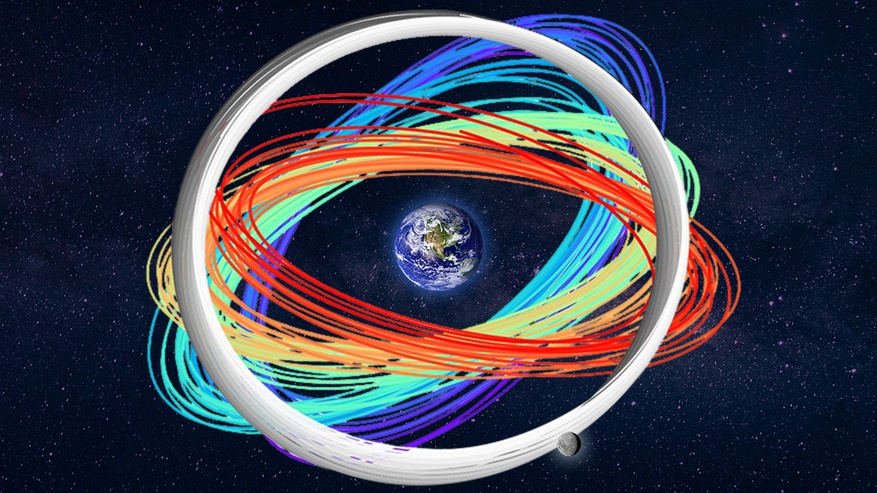SpaceX Launches New Legal Battle Against US Air Force

Breaking space news, the latest updates on rocket launches, skywatching events and more!
You are now subscribed
Your newsletter sign-up was successful
Want to add more newsletters?

Delivered daily
Daily Newsletter
Breaking space news, the latest updates on rocket launches, skywatching events and more!

Once a month
Watch This Space
Sign up to our monthly entertainment newsletter to keep up with all our coverage of the latest sci-fi and space movies, tv shows, games and books.

Once a week
Night Sky This Week
Discover this week's must-see night sky events, moon phases, and stunning astrophotos. Sign up for our skywatching newsletter and explore the universe with us!

Twice a month
Strange New Words
Space.com's Sci-Fi Reader's Club. Read a sci-fi short story every month and join a virtual community of fellow science fiction fans!
WASHINGTON — A lawsuit filed May 17 by SpaceX against the U.S. government was made public on Wednesday. In the 79-page redacted bid protest, SpaceX challenges the U.S. Air Force's Oct. 10 decision to award development contracts to its competitors and exclude SpaceX.
SpaceX's bid protest with the Court of Federal Claims challenges the Air Force Space and Missile Systems Center's decision to deny SpaceX a Launch Service Agreement contract as "arbitrary and capricious and contrary to law."
The Air Force awarded LSA cost-sharing contracts to Blue Origin ($500 million), United Launch Alliance ($967 million) and Northrop Grumman ($762 million) to help the companies defray the costs of meeting the government's unique launch requirements for the upcoming launch procurement competition known as National Security Space Launch Phase 2 Launch Service Procurement. Without LSA funds, SpaceX is required to bear the brunt of those costs on its own. In the redacted portions of the complaint, SpaceX includes what it estimates those cost would be, such as the construction of a payload integration facility at the Eastern Range launch complex. The figures were redacted.
Related: In Photos: SpaceX's Amazing Triple Rocket Landing of Falcon Heavy
A company spokesperson in a statement to SpaceNews says SpaceX "respectfully disagrees with the Air Force's LSA award decision. While we support the Air Force moving forward with its Phase 2 acquisition strategy for national security space launches as currently planned, we are formally challenging the Air Force's LSA decision to ensure a level playing field for competition."
The bid protest lays out in detail the reasons why SpaceX believes the court should declare that the LSA award decision "violates the requirement competitive procedures." It also asks the court to suspend further LSA investments by the government and reevaluate SpaceX's proposal.
The entire complaint is a harshly worded condemnation of the Air Force's criteria for selecting launch providers and is especially critical of what SpaceX contends is an institutional bias toward longtime launch provider ULA. Since it emerged as a contender in the launch market a decade ago, SpaceX has sought to challenge ULA's dominance. In 2013, SpaceX sued the Air Force over its decision to award ULA a bulk purchase of launches instead of allowing competitive bids for the work.
Breaking space news, the latest updates on rocket launches, skywatching events and more!
In the current complaint, SpaceX argues that with its LSA decision, the Air Force "chose the portfolio that best served the needs of ULA, the long-standing incumbent, by awarding an LSA to ULA and an LSA to each of the two offers that are currently developing major components for ULA's system."
Blue Origin is developing the BE-4 engine for its own New Glenn rocket and for ULA's Vulcan Centaur. Northrop Grumman makes solid rocket boosters that will be used to power its own OmegA launch vehicle and to augment the Vulcan rocket.
The lawsuit says ULA, Northrop Grumman and Blue Origin proposed only conceptual rockets whereas SpaceX has proven commercially viable vehicles. For the first time, SpaceX discloses that its LSA proposal included a portfolio of vehicles, the Falcon 9 and Falcon Heavy, in addition to the still-in-development Starship deep space exploration vehicle.
SpaceX offered Falcon 9 and Falcon Heavy "for the vast majority (if not all) the manifested Phase 2 RFP missions and the developmental Starship for missions scheduled to launch in 2025 or after," says the complaint. SpaceX argues that it proposed the "least risky" approach for assured access to space and to end reliance on Russian rocket engines currently used by ULA's Atlas 5. Nevertheless, the Air Force gave SpaceX's bid a "high risk" rating for its ability to launch the larger category C payloads.
The protest points out that Falcon 9 and Falcon Heavy to date have launched more than 70 national security, civil and commercial missions.
SpaceX calls that the three LSA winner vehicles "paper rockets," none of which has a meaningful chance of being ready in time for the Phase 2 performance period." In Phase 2 the Air Force will select two suppliers in 2020 to start launching payloads in 2022.
Over the past two days, all three LSA winners have filed "motions to intervene" in the SpaceX lawsuit. This allows the three companies to be parties in the lawsuit and protect any interests that might be put at risk by any court decision. ULA and Blue Origin filed their motions May 21 and Northrop Grumman on May 22. The Department of Justice, which represents the U.S. government in the suit, can turn to these three companies for documentation or data that could help win the case.
SpaceX noted in the complaint that soon after the Oct. 10 LSA awards were announced, the company voiced its concerns to the Air Force. It filed an objection Dec 10 but SMC did not agree, and officially denied SpaceX's objection on April 18, 2019, leading SpaceX to seek relief in court.
The protest does not mention that SpaceX CEO Elon Musk reportedly admitted that its LSA proposal was flawed during a conversation with then Deputy Defense Secretary Patrick Shanahan on Dec. 6, 2018. The comments by Musk were reported by the Pentagon Inspector General April 25 in a report of its investigation of Shanahan for unethical conduct. The IG cleared Shanahan of any improper actions. A member of Shanahan's staff attended and summarized the meeting in a memo that was given to the IG. Musk noted that SpaceX was not successful in the Air Force LSA competition and that SpaceX had written a poor proposal that "missed the mark."
Industry sources who spoke with SpaceNews on Wednesday said Musk's comments could come back to haunt SpaceX in its challenge of the LSA awards. According to these sources, the Air Force gave SpaceX an opportunity to revise its proposal but the company chose not to.
SpaceX offered a different story, with a company source saying on background that the Air Force declined to engage in any discussion about the company's objection to the Launch Services Agreement award decision.
The company insists that it is not seeking to delay or stop the National Security Space Launch Phase 2 Launch Service Procurement. The complaint filed with the Court of Federal Claims, it says, is only intended to give an independent third party an opportunity to review a decision it considers flawed.
Absent any court actions to reverse the LSA decision, says the complaint, "SpaceX will suffer the irreparable harm of being deprived of the opportunity to compete fairly." Because of the flawed and biased treatment of SpaceX, the company will suffer "substantial competitive harm" in the final phase of this procurement, the Phase 2 competition.
SpaceNews senior writer Jeff Foust contributed to this story.
- Read SpaceNews for the Latest Space Industry News
- SpaceX Crew Dragon Accident Another Bump in the Road for Commercial Crew
- Parachutes Pop Perfectly In SpaceX Test
This story was provided by SpaceNews, dedicated to covering all aspects of the space industry.

Sandra Erwin covers the military and national security beat as a Senior Staff Writer at SpaceNews. Sandra, based in Arlington, Virginia, specializes in Defense Department and Intelligence Community space programs, policy, budgets, technology and the industry that supports this sector. She joined SpaceNews in October 2017. Before coming to SpaceNews, Erwin covered the U.S. military, the Pentagon, Congress and the defense industry for over two decades as editor of the National Defense Industrial Association's National Defense Magazine and Pentagon correspondent for Real Clear Defense.

